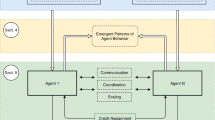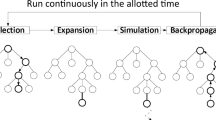Abstract
The Google Artificial Intelligence (AI) Challenge is an international contest the objective of which is to program the AI in a two-player real time strategy (RTS) game. This AI is an autonomous computer program that governs the actions that one of the two players executes during the game according to the state of play. The entries are evaluated via a competition mechanism consisting of two-player rounds where each entry is tested against others. This paper describes the use of competitive coevolutionary (CC) algorithms for the automatic generation of winning game strategies in Planet Wars, the RTS game associated with the 2010 contest. Three different versions of a prime algorithm have been tested. Their common nexus is not only the use of a Hall-of-Fame (HoF) to keep note of the winners of past coevolutions but also the employment of an archive of experienced players, termed the hall-of-celebrities (HoC), that puts pressure on the optimization process and guides the search to increase the strength of the solutions; their differences come from the periodical updating of the HoF on the basis of quality and diversity metrics. The goal is to optimize the AI by means of a self-learning process guided by coevolutionary search and competitive evaluation. An empirical study on the performance of a number of variants of the proposed algorithms is described and a statistical analysis of the results is conducted. In addition to the attainment of competitive bots we also conclude that the incorporation of the HoC inside the primary algorithm helps to reduce the effects of cycling caused by the use of HoF in CC algorithms.





Similar content being viewed by others
References
Angeline PJ, Pollack JB (1993) Competitive environments evolve better solutions for complex tasks. In: Forrest S (ed) 5th International conference on genetic algorithms (ICGA93). Morgan Kaufmann, San Mateo, pp 264–270
Ashlock D, Ashlock W, Samothrakis S, Lucas SM, Lee C (2012) From competition to cooperation: co-evolution in a rewards continuum. In: IEEE conference on computational Intelligence and games (CIG 2012). IEEE, Granada, pp 33–40
Avery P, Louis SJ (2010) Coevolving team tactics for a real-time strategy game. In: IEEE congress on evolutionary computation (CEC 2010). IEEE, Barcelona, pp 1–8
Avery P et al (2008) Coevolving a computer player for resource allocation games: using the game of Tempo as a test space. PhD Thesis, School of Computer Science, University of Adelaide
Avery PM, Greenwood GW, Michalewicz Z (2008) Coevolving strategic intelligence. In: IEEE congress on evolutionary computation (CEC 2008). IEEE, Hong Kong, pp 3523–3530
Avery PM, Michalewicz Z (2007) Static experts and dynamic enemies in coevolutionary games. In: IEEE congress on evolutionary computation (CEC 2007). IEEE, pp 4035–4042
Buro M (2004) Call for AI research in RTS games. In: Fu D, Orkin J (eds) AAAI workshop on challenges in game AI, San Jose, pp 139–141
Cook M, Colton S, Gow J (2012) Initial results from co-operative co-evolution for automated platformer design. In: Chio CD, Agapitos A, Cagnoni S, Cotta C, de Vega FF, Caro GAD, Drechsler R, Ekárt A, Esparcia-Alcázar AI, Farooq M, Langdon WB, Guervós JJM, Preuss M, Richter H, Silva S, Simões A, Squillero G, Tarantino E, Tettamanzi A, Togelius J, Urquhart N, Uyar S, Yannakakis GN (eds) Applications of evolutionary computation—EvoApplications (EvoGAMES). Lecture notes in computer science, vol 7248. Springer, Berlin, pp 194–203
Corruble V, Madeira CAG, Ramalho G (2002) Steps toward building of a good AI for complex Wargame-Type simulation games. In: Mehdi QH, Gough NE (eds) 3rd International conference on intelligent games and simulation (GAME-ON 2002), London, pp 155–159
de Jong E (2004) Towards a bounded Pareto-Coevolution archive. In: Congress on evolutionary computation (CEC2004), vol 2. IEEE, Portland, pp 2341–2348
Dziuk A, Miikkulainen R (2011) Creating intelligent agents through shaping of coevolution. In: IEEE congress on evolutionary computation (CEC 2011), IEEE, New Orleans, pp 1077–1083
Ebner M, Watson RA, Alexander J (2010) Coevolutionary dynamics of interacting species. In: Chio CD, Cagnoni S, Cotta C, Ebner M, Ekárt A, Esparcia-Alcázar A, Goh CK, Guervós JJM, Neri F, Preuss M, Togelius J, Yannakakis GN (eds) Applications of evolutionary computation, EvoApplicatons 2010 (EvoApplications (1)). Lecture notes in computer science, vol 6024. Springer, Berlin, pp 1–10
Fernández-Ares A, Mora AM, Guervós JJM, García-Sánchez P, Fernandes C (2011) Optimizing player behavior in a real-time strategy game using evolutionary algorithms. In: IEEE congress on evolutionary computation (CEC 2011), IEEE, New Orleans, pp 2017–2024
Ficici SG, Bucci A (2007) Advanced tutorial on coevolution. In: 2007 GECCO conference companion on genetic and evolutionary computation. ACM, New York, pp 3172–3204
Gutiérrez JAG, Cotta C, Fernández Leiva AJ (2011) Design of emergent and adaptive virtual players in a war RTS game. In: Ferrández JM, Sánchez JRÁ, de la Paz F, Toledo FJ (eds) 4th International work-conference on the interplay between natural and artificial computation (IWINAC 2011). Lecture notes in computer science, vol 6686. Springer, La Palma, pp 372–382
Jaskowski W, Krawiec K (2010) Coordinate system archive for coevolution. In: IEEE congress on evolutionary computation (CEC 2010), IEEE, Barcelona, pp 1–10
Johnson RW, Melich ME, Michalewicz Z, Schmidt M (2004) Coevolutionary Tempo game. In: Congress on evolutionary computation (CEC 2004), vol 2, IEEE, Portland, pp 1610–1617
Kruskal W, Wallis W (1952) Use of ranks in one-criterion variance analysis. J Am Stat Assoc 47(260):583–621
Lichocki P (2008) Evolving players for a real-time strategy game using gene expression programming. Master Thesis, Poznan University of Technology
Lidén L (2004) Artificial stupidity: the art of intentional mistakes. In: AI game programming wisdom 2. Charles River Media, Inc., Hingham, pp 41–48
Livingstone D (2005) Coevolution in hierarchical ai for strategy games. In: IEEE conference on computational intelligence and games (CIG 2005). IEEE, Colchester, Essex
Lucas SM (2009) Computational intelligence and AI in games: a new IEEE transactions. IEEE Trans Comput Intell AI Games 1(1):1–3
Lucas SM, Mateas M, Preuss M, Spronck P, Togelius J (2012) Artificial and computational intelligence in games (Dagstuhl seminar 12191). Dagstuhl Rep 2(5):43–70
Miconi T (2009) Why coevolution doesn’t “Work”: superiority and progress in coevolution. In: Vanneschi L, Gustafson S, Moraglio A, Falco ID, Ebner M (eds) Genetic programming, 12th European conference (EuroGP 2009). Lecture notes in computer science, vol 5481. Springer, Berlin, pp 49–60
Miles C, Louis SJ (2006) Co-evolving real-time strategy game playing influence map trees with genetic algorithms. In: International congress on evolutionary computation (CEC 2006). IEEE, Vancouver
Mora AM, Fernández-Ares A, Guervós JJM, García-Sánchez P, Fernandes CM (2012) Effect of noisy fitness in real-time strategy games player behaviour optimisation using evolutionary algorithms. J Comput Sci Technol 27(5):1007–1023
Nerome M, Yamada K, Endo S, Miyagi H (1998) Competitive co-evolution based game-strategy acquisition with the packaging. In: Jain LC, Jain RK (eds) Knowledge-based intelligent electronic systems, 2nd international conference (KES (3)). IEEE, Adelaide, pp 184–189
Nogueira M, Gálvez J, Cotta C, Fernández-Leiva A (2012) Hall of Fame based competitive coevolutionary algorithms for optimizing opponent strategies in a new RTS game. In: Fernández-Leiva A et al A (ed) 13th Annual European conference on simulation and AI in computer games (GAME-ON 2012). Eurosis, Málaga, pp 71–78
Nogueira M, Gálvez J, Cotta C, Fernández-Leiva A (2013) An analysis of hall-of-fame strategies in competitive coevolutionary algorithms for self-learning in RTS games. In: International conference on learning and intelligent optimization (LION7), LNCS. Springer, Catania
Reynolds C (1994) Competition, coevolution and the game of tag. In: Brooks R, Maes P (eds) Proceedings of artificial life IV. MIT Press, Cambridge, pp 59–69
Rosin C, Belew R (1997) New methods for competitive coevolution. Evol Comput 5(1):1–29
Rosin CD, Belew RK (1995) Methods for competitive co-evolution: finding opponents worth beating. In: Eshelman LJ (ed) 6th International conference on genetic algorithms (ICGA). Morgan Kaufmann, San Mateo, pp 373–381
Samothrakis S, Lucas SM, Runarsson TP, Robles D (2013) Coevolving game-playing agents: measuring performance and intransitivities. IEEE Trans Evol Comput 17(2):213–226
Sims K (1994) Evolving 3D morphology and behavior by competition. Artif Life 1(4):353–372
Smith G, Avery P, Houmanfar R, Louis SJ (2010) Using co-evolved RTS opponents to teach spatial tactics. In: Yannakakis GN, Togelius J (eds) IEEE conference on computational intelligence and games (CIG 2010). IEEE, Copenhagen, pp 146–153
Sokal Robert R, Rohlf James F (1995) Biometry: the principles and practice of statistics in biological research. W.H. Freeman and Company, New York
Szita I, Ponsen MJV, Spronck P (2009) Effective and diverse adaptive game AI. IEEE Trans Comput Intell AI Games 1(1):16–27
Togelius J, Yannakakis GN, Stanley KO, Browne C (2011) Search-based procedural content generation: a taxonomy and survey. IEEE Trans Comput Intell AI Games 3(3):172–186
Acknowledgments
This work is partially supported by Spanish MICINN under Project ANYSELF (TIN2011-28627-C04-01),Footnote 3 by Junta de Andalucía under Project P10-TIC-6083 (DNEMESIS)Footnote 4 and by Universidad de Málaga, Campus de Excelencia Internacional Andalucía Tech.
Author information
Authors and Affiliations
Corresponding author
Rights and permissions
About this article
Cite this article
Nogueira Collazo, M., Cotta, C. & Fernández-Leiva, A.J. Virtual player design using self-learning via competitive coevolutionary algorithms. Nat Comput 13, 131–144 (2014). https://doi.org/10.1007/s11047-014-9411-3
Published:
Issue Date:
DOI: https://doi.org/10.1007/s11047-014-9411-3




